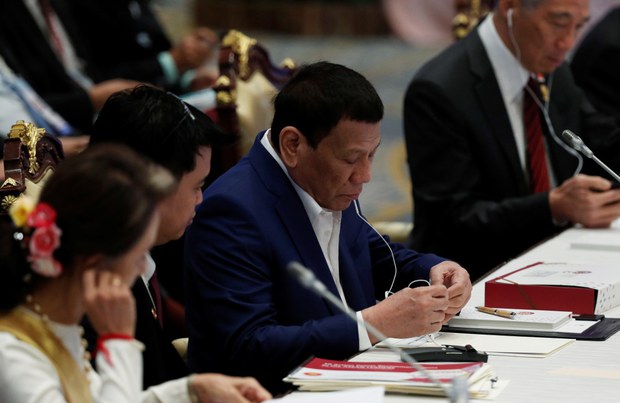Manila Agrees to Joint Investigation of South China Sea Incident
2019.06.22
Davao, Philippines
 Philippine President Rodrigo Duterte (center) attends the Association of Southeast Asian Nations summit in Bangkok, June 22, 2019.
Philippine President Rodrigo Duterte (center) attends the Association of Southeast Asian Nations summit in Bangkok, June 22, 2019.
Manila welcomed Beijing’s offer to conduct a joint investigation into the sinking of a Filipino fishing boat by a larger Chinese ship in the disputed South China Sea, a Philippine spokesman said Saturday, changing course one day after rejecting the proposal.
Presidential spokesman Salvador Panelo called for a representative from the Philippines and China along with one from a neutral country to investigate the June 9 incident when a Chinese trawler allegedly rammed into an anchored Filipino boat. A Vietnamese boat rescued 22 fishermen left afloat in the sea and the Philippines filed a protest with the United Nations.
“The palace wishes to inform our people that President Rodrigo Roa Duterte welcomes and accepts the offer of the Chinese government to conduct a joint investigation to determine what really transpired in Recto Bank and find a satisfactory closure to this episode,” he said in a statement issued to the media.
The announcement came on the same day Duterte is in Bangkok where members of Association of Southeast Asian Nations (ASEAN) are discussing a draft South China Sea code of conduct.
On Friday, Philippine Foreign Secretary Teodoro Locsin Jr. had rejected China's call for a joint probe, announcing that both countries would conduct their own investigations.
Panelo said separate investigations could lead to accusations of bias.
“Such circumstance will put any finding by any side open to question and place the entire issue in a confused state,” he said. “On the other hand, a joint and impartial investigation will not only promote the expedient resolution of the issue, it will also be in accordance with international law, including the United Nations Convention on the Law of the Sea.
“The basic dictates of justice demand a full account of the events that ultimately led to the abandonment of our 22 distressed fishermen in the middle of sea and accountability of those at fault,” Panelo said.
“To be clear, we are by no means relinquishing any inch of our sovereign rights, nor compromising the rights of our 22 fishermen. We are demanding justice for our countrymen and we are using all legal means toward that end.”
Previously, Duterte downplayed the incident during a speech before Philippine Navy personnel, dismissing it as an ordinary maritime accident.
Panelo’s statement is in line with what Chinese foreign ministry spokesman Lu Kang told reporters in Beijing on Thursday.
“To find a proper solution, we suggest a joint investigation at an early date so the two sides can exchange respective initial findings and properly handle the matter through friendly consultations based on mutually recognized investigation results,” the Chinese spokesman said.
Expressing China’s sympathy for the fishermen, Lu Kang called the incident an “accidental collision” between the two boats.
ASEAN discussions
In Bangkok, the Thai foreign ministry said ASEAN members had made good progress on a code of conduct negotiating draft for the South China Sea and were expected to finish a first reading by the end of the year, Reuters news service reported on Saturday.
“The single draft ... negotiating text is currently being discussed and negotiated between ASEAN and China,” foreign ministry spokeswoman Busadee Santipitaks told Reuters.
In August 2018, Chinese officials agreed to the draft during an ASEAN meeting in Singapore, calling it a breakthrough. ASEAN reaffirmed its call for “freedom of navigation in and overflight above the South China Sea.”
“Now just to clarify, this doesn’t mean that negotiations are over, but we’ve been able to put everything down onto a single draft and this draft will form the basis for subsequent negotiations,” Singapore Foreign Minister Vivian Balakrishnan said at the time.
Beijing claims most of the mineral-rich sea. Brunei, Malaysia, the Philippines, Vietnam and Taiwan also have overlapping claims to the maritime region.
While China and the ASEAN bloc had agreed to solve overlapping territorial claims to the sea peacefully and put in place a regional mechanism to avert conflict, Beijing has not ceased its expansion in the waterway.







